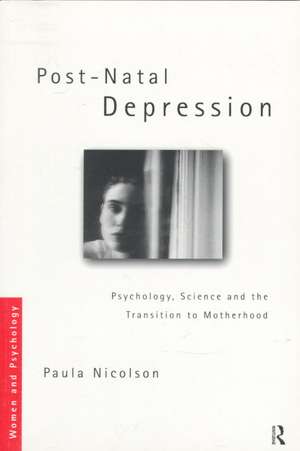Post-Natal Depression: Psychology, Science and the Transition to Motherhood: Women and Psychology
Autor Paula Nicolsonen Limba Engleză Paperback – 18 iun 1998
Post Natal Depression makes an important contribution to the psychology of women and feminist research and will be of interst to psychologists, social scientists, nurses and doctors.
Din seria Women and Psychology
-
 Preț: 294.59 lei
Preț: 294.59 lei -
 Preț: 279.66 lei
Preț: 279.66 lei -
 Preț: 295.16 lei
Preț: 295.16 lei -
 Preț: 294.44 lei
Preț: 294.44 lei -
 Preț: 294.49 lei
Preț: 294.49 lei -
 Preț: 283.44 lei
Preț: 283.44 lei -
 Preț: 389.59 lei
Preț: 389.59 lei - 16%
 Preț: 117.58 lei
Preț: 117.58 lei - 21%
 Preț: 242.72 lei
Preț: 242.72 lei -
 Preț: 369.95 lei
Preț: 369.95 lei -
 Preț: 345.28 lei
Preț: 345.28 lei - 5%
 Preț: 370.61 lei
Preț: 370.61 lei - 19%
 Preț: 271.20 lei
Preț: 271.20 lei -
 Preț: 365.36 lei
Preț: 365.36 lei -
 Preț: 463.62 lei
Preț: 463.62 lei -
 Preț: 442.68 lei
Preț: 442.68 lei -
 Preț: 411.42 lei
Preț: 411.42 lei -
 Preț: 411.00 lei
Preț: 411.00 lei -
 Preț: 385.29 lei
Preț: 385.29 lei -
 Preț: 476.01 lei
Preț: 476.01 lei -
 Preț: 370.71 lei
Preț: 370.71 lei - 17%
 Preț: 244.50 lei
Preț: 244.50 lei -
 Preț: 369.18 lei
Preț: 369.18 lei -
 Preț: 444.62 lei
Preț: 444.62 lei -
 Preț: 363.25 lei
Preț: 363.25 lei - 18%
 Preț: 999.46 lei
Preț: 999.46 lei -
 Preț: 370.71 lei
Preț: 370.71 lei - 13%
 Preț: 297.57 lei
Preț: 297.57 lei - 18%
 Preț: 997.93 lei
Preț: 997.93 lei -
 Preț: 441.74 lei
Preț: 441.74 lei - 19%
 Preț: 269.10 lei
Preț: 269.10 lei - 5%
 Preț: 369.38 lei
Preț: 369.38 lei - 21%
 Preț: 243.46 lei
Preț: 243.46 lei -
 Preț: 394.02 lei
Preț: 394.02 lei
Preț: 362.82 lei
Nou
Puncte Express: 544
Preț estimativ în valută:
69.43€ • 72.22$ • 57.32£
69.43€ • 72.22$ • 57.32£
Carte tipărită la comandă
Livrare economică 14-28 aprilie
Preluare comenzi: 021 569.72.76
Specificații
ISBN-13: 9780415163637
ISBN-10: 0415163633
Pagini: 160
Ilustrații: black & white illustrations
Dimensiuni: 156 x 234 x 12 mm
Greutate: 0.29 kg
Ediția:Revised
Editura: Taylor & Francis
Colecția Routledge
Seria Women and Psychology
Locul publicării:Oxford, United Kingdom
ISBN-10: 0415163633
Pagini: 160
Ilustrații: black & white illustrations
Dimensiuni: 156 x 234 x 12 mm
Greutate: 0.29 kg
Ediția:Revised
Editura: Taylor & Francis
Colecția Routledge
Seria Women and Psychology
Locul publicării:Oxford, United Kingdom
Public țintă
Postgraduate and UndergraduateRecenzii
'I would recommend this book wholeheartedly both to those working in the field, whether as researcher or practitioner, or for students. The book could also provide much food for thought for the more general reader of health and clinical issues.' - Deborah Biggerstaff, University of Birmingham, in the 'Journal of Reproductive and Infant Psychology'
'Whilst written from a perspective of feminist research, this book provides a wide view of the social factors affecting mothers who experience post-natal depression . . . The subject of post-natal depression, as presented here, would be of interest not only to psychologists and social scientists but also to midwives and health visitors, as in these professions a broad view of childbirth as a normal, healthy life event is increasingly encouraged.' - Health Psychology Update
'Whilst written from a perspective of feminist research, this book provides a wide view of the social factors affecting mothers who experience post-natal depression . . . The subject of post-natal depression, as presented here, would be of interest not only to psychologists and social scientists but also to midwives and health visitors, as in these professions a broad view of childbirth as a normal, healthy life event is increasingly encouraged.' - Health Psychology Update
Cuprins
Introduction 1 Women’s experience of motherhood 2 Competing explanations of post-natal depression 3 The context of post-natal depression 4 Post-natal care and ‘maternity blues’ 5 Reflexivity, intervention and the construction of post-natal depression 6 Loss, happiness and post-natal depression: the ultimate paradox 7 Knowledge, myth and the meaning of post-natal depression
Notă biografică
Paula Nicolson is Senior Lecturer in Health Psychology at the Sheffield School for Health and Related Research, Sheffield University. Her previous publications include Gender, Power and Organization (1996), Female Sexuality (1994; edited with Precilla Choi), and Gender Issues in Clinical Psychology (1992; edited with Jane Ussher).
Descriere
Paula Nicolson provides a radical critique of traditional medical and social science explanations of post-natal depression; she argues that far from it being an abnormal condition it is a healthy response to a series of losses.















